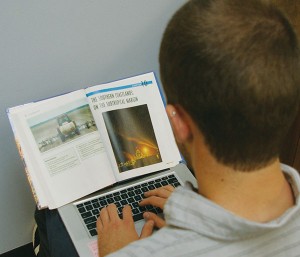Textbooks and trade books alike are being slowly transformed into a digital format

One of the latest technologies that will have students on college campuses buzzing is the eTextbook. This new format involves a digital version of the monstrosities that most collegiate age people are seen lugging around campus.
Course Smart, an eTextbook company that uses a website to make texts accessible to students via online ordering, offers over 7,000 titles that are commonly used across the nation. They also claim that the price they offer for eBooks will save students an average of $62.99 when opting for the digital version.
This trend is right in line with the recent growing popularity of Amazon’s Kindle, a digital reading device, and the up and coming Barnes and Noble technology that plans to rival the Kindle’s success. There are other reading devices out there but as of yet, the Kindle has created the most buzz.
The Kindle has the ability to store around 345,000 books, can access many daily newspapers, magazines, and with their new DX model, textbooks. This technology will no doubt come with a reaction from many who will cling to their book collections and shelves filled with reading material collected over a lifetime.
While the time honored tradition of filling shelves with books may be trampled on a bit here, the digital age will no doubt continue its dominance over more sectors of daily life.
In a review for the Kindle on Amazon.com, one user said, “One of the unexpected great things is not having to deal with my bookmark falling out and having to find my place again.”
When looking at this issue from the bookseller’s point of view, it’s not all bad news. Barnes and Noble claims to have entered the digital age more than ten years ago, and seem to happily embrace this transition.
In a newsletter circulated to all Barnes and Noble campus bookstores, eBooks were described as, “…(eBook) is an electronic textbook that can be downloaded onto a personal computer (or electronic reader) or accessed daily from the internet. Depending on the publisher and format, digital books contain different features and options.”
Bookstores may look drastically different in the coming years if this technology is truly going to become the premier format for books, but this may offer students more options and possibilities in the areas of study.
College students will also have a less expensive college bill if their cost of books is drastically reduced. This revolution will no doubt affect consumers and producers alike.
